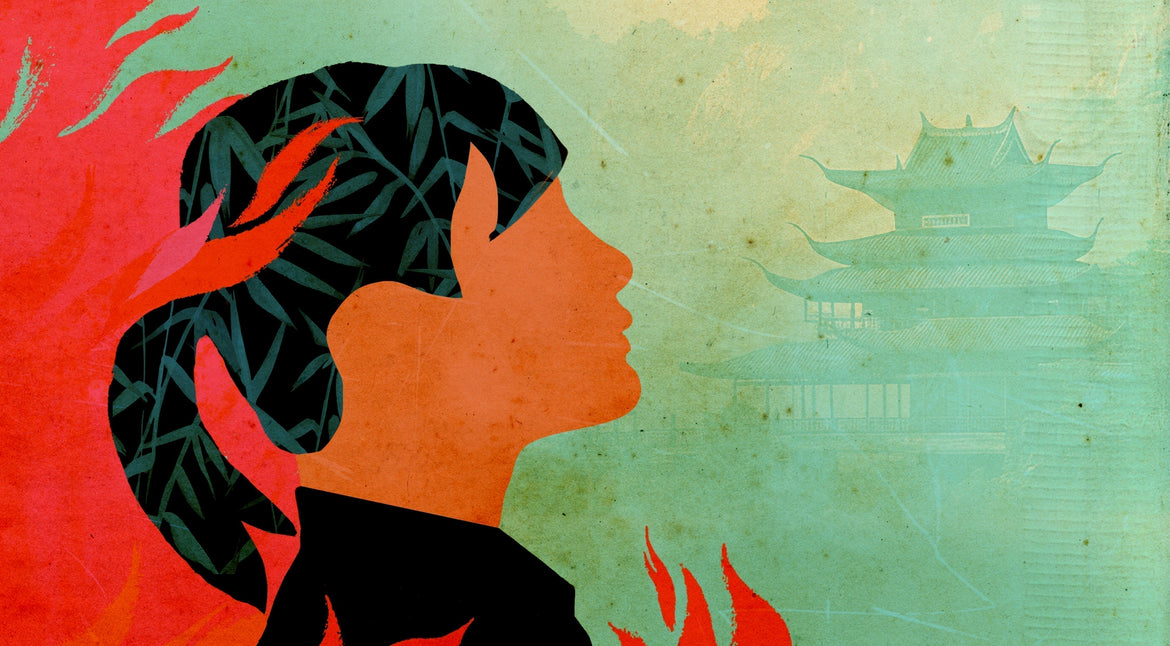
My Mother, the Quiet and Mighty Woman

For Mother's Day and AAPI Month, The Immortal Woman author Su Chang reflects on motherhood, hidden histories, and the layered lives of women.
I was always a daddy’s girl. My father was the reader, the artist, the intellectual — someone I wanted to become when I grew up. From his paternal lineage, I was a descendant of hot-blooded revolutionaries. My mother, on the other hand, was someone I couldn’t relate to during my childhood. She never participated in our passionate dinner-table debates. My image of her always involved some kind of cleaning implement — a mop, a broomstick, a feather duster. She cleaned our apartment with a soldier’s resolve, before we woke up in the morning and after we went to bed. When she wasn’t cleaning, she tended to her flowerpots on the balcony under the slanting sunlight. Back when we still had a small Shanghai townhouse to our name, she even planted a miniature bamboo forest in our stamp-sized backyard. She loved order and beauty. She was a woman of few words.
 Here is what I didn’t understand as a child: when you live with someone carrying unprocessed and unresolved trauma, it is imperative to find coping mechanisms. To my young eyes, my father embodied boundless wisdom and a restless, creative energy. It took me decades and a hard journey through immigration to understand that much of his wisdom and energy originated from the heavy blows he’d suffered in his youth, dealt by his beloved motherland. When his anger and sorrow subsumed his usual charm and bubbled to the surface, I’d feel startled and confused, retreating to our family bookshelves. Over time, I became obsessed with our hidden history. To cope with my father’s inexplicable pain, I chose to read and research, and eventually wrote The Immortal Woman, a novel partially inspired by his experiences. I was slow to realize that, in a similar way, cleaning and gardening were my mother’s chosen coping mechanisms.
Here is what I didn’t understand as a child: when you live with someone carrying unprocessed and unresolved trauma, it is imperative to find coping mechanisms. To my young eyes, my father embodied boundless wisdom and a restless, creative energy. It took me decades and a hard journey through immigration to understand that much of his wisdom and energy originated from the heavy blows he’d suffered in his youth, dealt by his beloved motherland. When his anger and sorrow subsumed his usual charm and bubbled to the surface, I’d feel startled and confused, retreating to our family bookshelves. Over time, I became obsessed with our hidden history. To cope with my father’s inexplicable pain, I chose to read and research, and eventually wrote The Immortal Woman, a novel partially inspired by his experiences. I was slow to realize that, in a similar way, cleaning and gardening were my mother’s chosen coping mechanisms.
At first glance, my mother seems to fit the perfect image of a Confucian woman in a patriarchal society: modest, responsible, self-sacrificing, and devoid of personal ambitions. According to our Old Sage, a woman without intelligence or ability is a truly virtuous woman. So, imagine my shock when, at fourteen, I discovered her brilliance. She was top of her class in math and science in high school and at eighteen, she was offered a full scholarship to Qinghua, the nation’s top STEM university. But Mom ultimately turned down the coveted offer to stay with her parents, who were already suffering from endless pining and heartache — their son was sent down to the countryside during the Youth Rustication movement in the ‘60s. My mother took up an ordinary factory job instead. While young ladies her age buzzed in and out of the dating pool at her Work Unit, she turned her head away from a long line of suitors. A famed beauty, she was neither tempted by ego nor daunted by loneliness. “I was waiting for the right person to come along; didn’t want to waste anyone’s time just for the sake of dating,” she told me once in her signature calm tone. Years later, when a rogue player destroyed my father’s fledgling business, it was my mother who took on extra work to support our family. She perpetually stayed out of the limelight, so I had missed her quiet, mighty strength.
When my first child was born, my parents flew all the way from China to help. For months, my postpartum mood disorder went undiagnosed and untreated. Every few hours, I’d hook myself to the hands-free pumping machine while feverishly scribbling down fictional stories — the only way I knew to fight the raging hormones. At dinner, true to our family tradition, I’d get into heated debates with my father while my baby bounced on my lap. My mother, surrounded by madness, instinctively knew what I needed. She cooked meal after meal, knitted adorable baby sweaters, perched by the crib at naptime, singing hushed lullabies to her beloved grandchild.
Years after my solo immigration to North America, Dad told me he was relieved to see how much I resembled my mother. I was surprised. I didn’t think Mom and I had much in common. But Dad rattled off a long list: my analytical mind, my knack for organization and time management, how often my rational side prevailed over impulse. “All thanks to your mom,” he said, eyes moist. “Unlike me, you have the tools to rein in unbridled passion, the anchor of realism to counter the flight of fantasy.” I could only nod, feeling a surge of pride for my mother. Sometimes I wish I led a quiet life like Mom, finding pleasure, even meaning and purpose, in the humdrum moments. Her kind of unflappable, unassuming life requires more courage and resilience than I have in store. But I will keep trying.
Learn more about The Immortal Woman.

